DEVELOPMENT
4,436
Weekly Update 2020-1 (Development)
5 years ago - Edited 5 years ago
I've done quite a bit on the MARDEK Reimagining this past week! This time, I'll be talking about the title I've decided on, and a basic battle system I've planned and got working!
I've decided to write 'weekly update' posts, divided into two parts. There's the
∞ half where I rant about my dismal personal experiences ∞ (why didn't I become a marketer, with this knack for making things sound appealing??), and there's this, where I talk about what I've achieved project-wise.
![]()
Title Decision!
I talked in a previous post about using the title
Divine Dreams, which is likely what I'll stick with. It's multi-layered; here are the word definitions for
∞ divine ∞ and
∞ dream ∞:
divine
Adjective
1. Of or pertaining to a god.
2. Eternal, holy, or otherwise godlike.
3. Of superhuman or surpassing excellence.
4. Beautiful, heavenly.
5. (obsolete) Foreboding; prescient.
6. (obsolete, of souls) immortal; elect or saved after death.
7. Relating to divinity or theology.
Noun
1. One skilled in divinity; a theologian.
2. A minister of the gospel; a priest; a clergyman.
3. (often capitalized, with 'the') God or a god, particularly in its aspect as a transcendental concept.
Verb
1. (transitive) To foretell (something), especially by the use of divination.
2. (transitive) To guess or discover (something) through intuition or insight.
3. (transitive) To search for (underground objects or water) using a divining rod.
4. To render divine; to deify.
dream
Noun
dream (plural dreams)
1. Imaginary events seen in the mind while sleeping.
2. A hope or wish.
3. A visionary scheme; a wild conceit; an idle fancy.
Verb
1. (intransitive) To see imaginary events in one's mind while sleeping.
2. (intransitive) To hope, to wish.
3. (intransitive) To daydream.
4. (transitive) To envision as an imaginary experience (usually when asleep).
5. (intransitive) To consider the possibility (of).
Adjective
1. ideal; perfect
Many of these meanings are appropriate to the setting and story, and the title can be read in several different ways.
Consciousness makes up the substrate of the universe, and the worlds were literally dreamed up by the gods. Big parts of the story involve Dharma's desire to transcend the limits imposed by the gods, the cosmic jail he perceives them as being trapped in against their will, as well as traversing the non-Euclidean 'drealm' - the 'consciousness sea' in which Alora Fane's petal worlds are like 'dream islands' - which involves
divining locations using memories. There are also other things that are more spoilery to go into.
It could be read as "godly imaginings", "track down minds' fruit", "aspirations of godhood", "wonderful hopes", "God is asleep"...
You could even use a thesaurus to render 'divine' - in the 'God' meaning - as the ultimate or
final, and 'dream' as
fantasy...
So overall, it seems like a very good and extremely fitting title, now that I've given it more thought! (Plus the DD acronym amuses me.)
Maybe a lot of that doesn't make sense to anyone but me yet. It's the kind of thing that'd become clearer from actually playing the game, of course!
![]()
Battle System
First, I've made a model of Mardek; it's interesting seeing a years-old design in 3D finally:
![]()
For the most part it turned out okay, though the sword and shield are (obviously?) placeholders, the particle-based sword trail - which I left in accidentally - is likely to change, and I may or may not make some other minor changes to details of the design around the shirt bottom/hips area. The 'whale tail' double cowlick thing in his hair also looks bizarre in 3D; either I need to reshape that, or have some braid-like bit tying it up, so it looks like the trunk of a palm tree. It doesn't really make sense that he'd have hair in that shape considering the frizzy African style hair he has otherwise, but then again it's hardly the worst offender in the Most Ridiculous Fictional Hair category (I'm thinking of you, Seymour Guado, and everyone from Yu-Gi-Oh).
Also, I'm aware that I posted that silhouettes thing and have yet to formally reveal Mardek from it on this site. I'll still do that eventually, though I'm delaying that until I can use it to build up to the demo/Kickstarter/original MARDEK Steam re-release, which I can't predict a date for just yet.
I'm mentioning that first because he's used in this image, which is the main thing I want to talk about in this bit:
![]()
It's a battle system!!
It didn't take long to implement at all, and I absolutely don't consider it final in any way. It's more like a foundation to start building from.
A number of people have said that they consider MARDEK's system perfect, and that I should just keep it exactly as it is in this, and to some degree I agree with that after having recently replayed it myself. The aim here isn't to reinvent the wheel, and having an easy, fun battle system that allows anyone to get through the story without too much challenge or tedium - but without reducing the fun factor - would be ideal.
I think, though, that there are some changes that could be made while keeping the general essence the same. I mean, I'm not going down the path of Belief or Taming Dreams and turning it into an alternate interpretation of familiar mechanics based on something other than violence, but there are clunky or outdated features of the original battle system that I think could be streamlined or revised.
I'm aware that I need to be careful about it, though. A while back, I played the mobile game Pokemon Masters, which changed the traditional Pokemon battle system completely. I didn't much care for it, and I got the impression many other people felt the same based on in-game messages from the developers essentially apologising for the game being what it was. When I got Pokemon Sword (whoops, I forgot to write about that here! I finished ages ago), I was dreading changes to the battle system, but was relieved when there were none... at least at first, though as I went on I felt that many clunky elements of the system had been retained when they really
should have been improved in some way (for example, battles are so much slower than they need to be because things happen in sequence with text messages for each one).
I used to get excited as a child when games included RPG-like numerical stat mechanics (unaware that every game does, behind the scenes), though as I grew I came to really dislike systems where you had a ton of different stat values for different things. For example, here's a character's stats from Morrowind:
![]()
That's stuck in my mind since I first played it, many years ago, as an example of so many stats that it's just overwhelming. I spent probably over 100 hours in that game, and I still don't know what those eight stats do exactly. And having Health
and Magicka
and Fatigue seems like too much to me. Skyrim improved things massively, simplifying stats stuff while keeping core mechanics (like skills) intact, from what I recall.
Actually, maybe this is even worse:
![]()
I love that game, but I don't know what most of those stats do. I can guess, but I'd have to look up the complex formulae used in damage calculations to know for certain. The game certainly doesn't tell you. There's something about the obscureness of it that just always bothered me. I particularly disliked how these stats grew drastically with each level up anyway, so what was the point of them? Why even have them if they change all the time in ways you can't even control? I never had to check what they were.
I used systems like this in my earliest games because I just assumed that's the way it had to be done, but I quickly felt I outgrew it.
I preferred the D&D system, where the stats were designed to be managed by human brains rather than computer algorithms. Everything's simpler, and your character's stats tend to be for the most part fixed. A change by even a single point to any stat really
means something, so an item or ability that improves that stat won't quickly lose its value.
It's a mentality I had when developing MARDEK, and in that, characters have four primary stats (STR, VIT, SPR, AGL)... but also ATK, DEF, MDEF, and a bunch of other things like elemental resistances etc. It all feels so bitty/granular in a way I've been openly annoyed about in the past. Each stat point mattered, but I also didn't even really know what my characters' stats
were until I made this gif just now. And even looking at them here, my eyes glaze over, I don't really take in the information because it doesn't feel valuable to know or understand.
![]()
I also feel that MP is an outdated concept, like expendable lives and a points score in a platformer, and I wanted to include an alternative to that. I never liked how JRPGs gave you a basic attack to use entirely for free while charging you for magic, which in many cases was no more useful or powerful (or it was used by mage characters who had no alternative actions to take).
![]()
This system I've made takes the simplified-stats idea to an extreme. Characters have two primary stats,
Body and
Mind (or maybe I'll use "Soul"). They're used as a combination between attack, defence, HP, and MP.
For example, say Mardek has 100 Body. His basic skill, Slash, deals damage equal to 40% of his Body stat. At full, this is 40 damage, but if he's at half Body, this goes down to 20; it represents him being overly fatigued, so his sword slashes lose their power (in contrast to other games, where a character can be swinging with full ferocity at 1 HP, only to fall down dead at a tap). His Slash skill
costs a few Body points to use, though, so he can literally kill himself by throwing himself into a physical attack if he's too weak.
Mind acts as a separate stat with a similar function; some skills deal Mind damage or have Mind costs, or have their power determined by the Mind stat, and being reduced to 0 Mind leads to KO.
There are no levels, but each time you either use a Body skill
or you're hit by one, you get 1 'Body XP'. Accumulating 6 of these increases your Body total by 1. So it's like slow but gradual gains from repeatedly exercising, rather than a span of nothing followed by a sudden, massive jolt of power. The same is true for the Mind stat.
Weapons grant a set amount of bonus damage; a sword might have +5 Body damage, for example. Shields reduce Body damage by a set amount if used, and perhaps there'd be defensive stats that do the same.
In MARDEK, you had basic reactions which were all the same. Here, attack reactions have a wide gold window and a narrow blue window. If you fail to hit either window, the attack misses. Gold means a normal hit. If you stop the cursor on the blue bit, it activates a 'bonus effect' specific to that skill. For example, Slash might have +10% damage as its bonus effect, while another skill might have a (greater) chance of inflicting a status effect. When you're being targeted, you just have the narrow gold window, and hitting it successfully makes the character block with their shield, subtracting the shield's defence value from the damage inflicted. Different skills or enemies might have different timings for their reactions.
Healing items take the form of food, since these seem fairly popular in other modern games and appeal to our basic animal instincts in a way that magic potions don't. It also means I can make food of different types, and each character has different preferences, meaning if they eat something they like, it'll be more effective than something of equal raw potency that they dislike. I like this since it gives each character more individually, and makes them seem (to me) more alive and human than just a bunch of Combat Units. Food items like meat, bread, and greens restore Body, while chocolate, savoury, or cake-based snacks restore Mind.
Characters have a 'turn meter' that fills according to their Speed stat, kind of like the old Final Fantasies' ATB system, except it immediately snaps to the next turn rather than expecting you to sit waiting watching bars fill up. The clock-like lightening of the runes in characters' stat circles shows this turn meter. Normally using a skill resets your turn meter to 0, though food items have 'heaviness' values, so for example one that restores only a few points might only reduce your turn meter by 20%, allowing you to act quicker, while something like an entire cake (eaten in one bite, of course) delays you by 150%, so it takes longer than usual to take your next turn. Perhaps skills would have similar variable speeds.
Does this animation make you laugh, or will it haunt your nightmares from now on?
![]()
It's based on an idea from Clarence RPG, and it amuses me quite a bit to imagine items like "Entire Roast Chicken" or "Live Rat" which are consumed with that animation, their model taking the place of that placeholder white orb. But I imagine mileage would very much vary there, so I might change it (probably to something like the eating animations in Breath of the Wild).
Currently, each character has a small selection of skills that can be upgraded via means I've yet to decide on, rather than the old-style-JRPG thing of having a 'basic attack' plus 'special skills' or magic that you collect but mostly neglect once better ones become available. I've not given the skills much thought though; I'll need to get around to that. I can only do so much at once!
Oh, and I think that's what both Deugan and the Leafish monster will look like in the final game. And I've changed their names to Marble and Dingle and that's final and I'm sticking with it and it's a good idea.
Some additional comments about the gif up there:
The quickly-added, experimental sword trails aren't ideal, especially since they're active all the time. I'll probably change that.
Characters' facial expressions really make characters feel more alive, in my opinion! The insane look on their faces as they leap to an attack amuses me, though I'll probably change that to something more fitting!
I quite like the minimalistic, circular GUI and the element glyphs, which are reminiscent of but different to the original MARDEK's. The more subdued colours feel more mature than my earlier games too.
![]()
I added this particular battle system sort of on a whim, and while I'm finding it fun to play around with in this simple demo, I don't know whether it'd scale to a full game's worth of battles. I can also imagine objections to it, many of them, but I'm curious about your thoughts anyway. But don't interpret this as "I've decided on the battle system and this is what it's like!"; it's more like "here's a random idea I've played around with for how things could possibly be!". It's interesting to take ideas from the realm of possibility to see how they fare in practice.
I've also started composing music for the game already, and wanted to talk about that, but I've written enough today already, so I'll save that for another post!





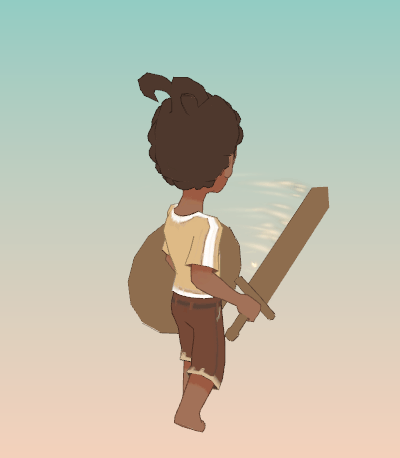
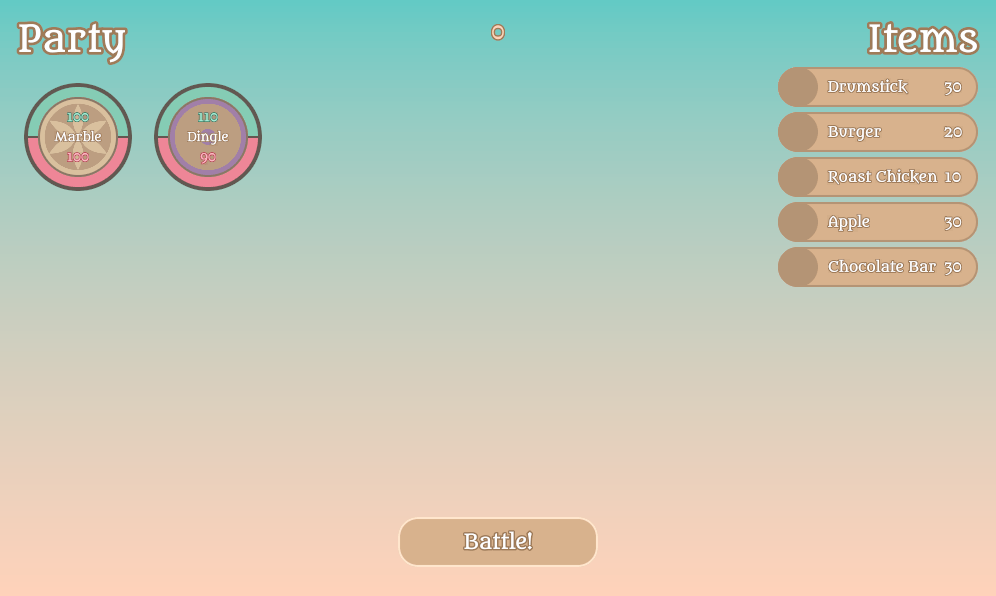
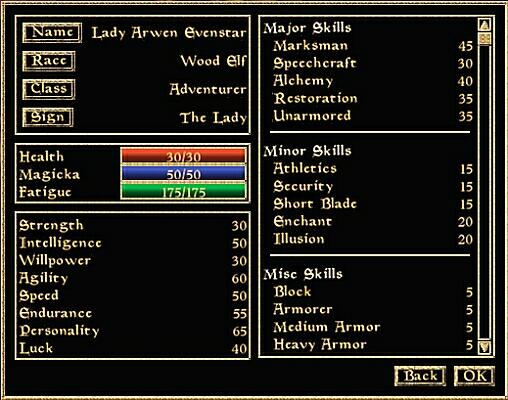
_007.png)
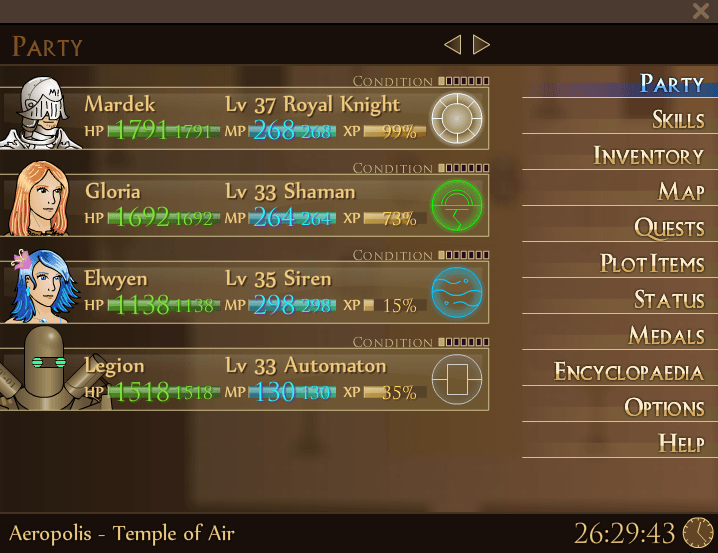
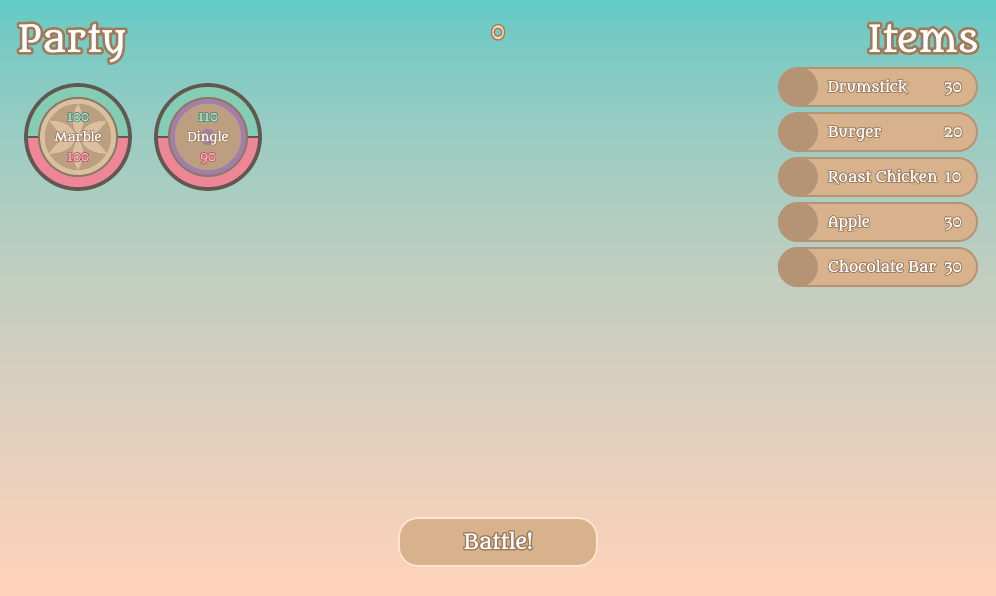
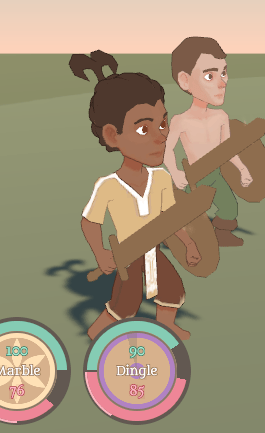
38